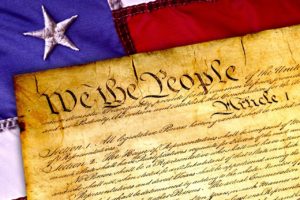Impeachment
Written by James S. Todd IV, Lecturer in the Department of Politics, College and Graduate School of Arts & Sciences
The Founders, when they met in Philadelphia, created a system of shared powers and checks and balances in the hope that it would prevent abuse of power. The main fear in those days was abuse of power by the legislature. However, Mr. Jefferson, in a letter to Mr. Madison March 15, 1789, predicted that abuse of power by the executive would “come in its turn…but at a remote period.”
One of the main safeguards against such abuse was the power of impeachment and removal, lodged in the legislative branch. Article I, Section 2 of the Constitution states that the House of Representatives “shall have the Sole Power of Impeachment.” There is no super-majority requirement, so it only takes a majority vote to impeach. Article I, Section 3 states “The Senate shall have the sole power to try all impeachments…[a]nd no person shall be convicted without the Concurrence of two thirds of the Members present.” That power has been used sparingly and primarily for the removal of U.S. District and Court of Appeals judges. Only one Supreme Court Justice, Samuel Chase, and two presidents, Andrew Johnson and William Jefferson Clinton, have been impeached by the House of Representatives and in each case there were not enough votes at the end of their trial in the Senate to remove them. (In Nixon’s case, the House Judiciary Committee approved Articles of Impeachment, but he resigned before a vote was taken in the full House.) Fifteen federal judges have been impeached, and the Senate held trials in each case with eight being convicted, four being acquitted, and three resigning in the midst of the trial.
There is some uncertainty as to the standard to be applied for impeachment. Article II, Section 4 of the Constitution states only that impeachment and conviction shall be for “Treason, Bribery, or other high Crimes and Misdemeanors.” It is the language “other high Crimes and Misdemeanors” that causes the uncertainty and the resultant disagreement. Welcome to the world of Constitutional interpretation. Some have argued that impeachment should only occur when the individual being impeached has committed an indictable crime. That would mean that abuse of power or neglect of duty to see that the laws are faithfully executed would not be impeachable offenses, which seems counter intuitive. Madison, speaking in the first Congress, June 17, 1789, added another instance where impeachment would be appropriate in spite of the lack of an indictable offense when he stated that “…the wanton removal of meritorious officers” would be impeachable.
That would seem particularly relevant to the question of whether President Trump will seek to have Special Counsel Robert Mueller removed. Attacks currently being leveled at Mueller would indicate that there is some disagreement as to whether he would qualify as a “meritorious officer.” In that light the cynic might argue that attempts by President Trump’s supporters to disparage Mueller are intended to weaken any case for impeachment of President Trump if he does remove him. On the other hand, if President Trump is guilty of obstruction of justice, a major factor in the impeachment articles for both Nixon and Clinton, firing the Special Counsel could provide further evidence against him. Whether a majority of the House of Representatives would vote to impeach remains to be seen and depends to a considerable extent on the evidence presented by the Special Counsel and that depends on whether he is allowed to continue his investigation and make his report. We have interesting and important days ahead.
- Guastavino Tile at the University of Virginia
- Abraham Lincoln on Character, Leadership and Education
- Silence is Golden: Celebrating the History of Silent Films
- Virginia Club of New York x The Essay Conqueror: The College Essayscape
- UVA Club of Los Angeles: Influential Communication
- UVA Club of Richmond: Hoos at the VMFA Jazz Cafe

